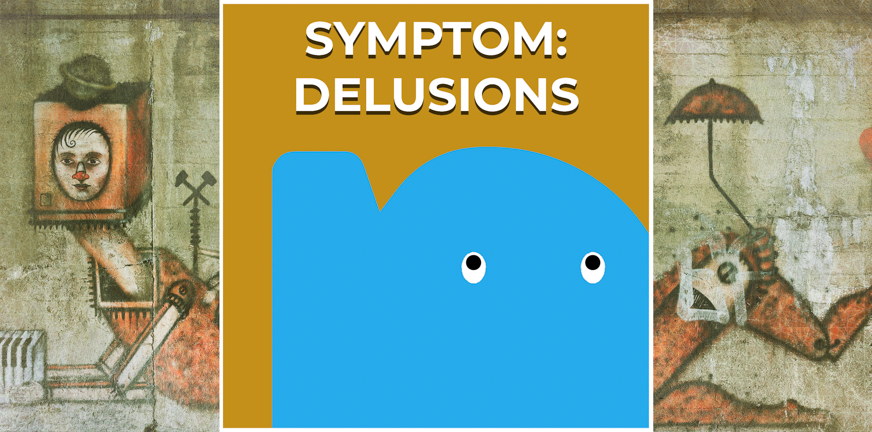
Delusions are unusual beliefs that the person continuous to hold despite clear evidence to the contrary. Something happens and you draw wrong conclusions that you are not prepared to modity. Delusions can be a part of psychosis. However, care should be taken not to include cultural or subgroup beliefs, or shared conspiracy beliefs, in the definition of ‘delusion’.
If you care to look a little deeper, you can often see that delusions are fueled by negative emotions such as anxiety and worries. They are therefore best seen as a metaphor for emotional distress and can be best approached as such, that is: with compassionate, human concern.
Delusions differ in the degree of intensity, frequency, associated distress, level of conviction and the impact they have on behaviour. With regard to the latter: a dangerous situation may arise if the logic of the delusion dictates that the person should, for example, ‘defend’ himself.
Different kinds of delusions
Delusions and hallucinations are often mentioned in the same breath. They certainly tend to co-occur together. They can both be a part of psychosis when you have lost touch with reality. There is a slight difference in meaning, however. Someone with hallucinations hears, sees, feels, tastes or smells things that are not really there. Having delusions means that your ideas do not match with ‘shared reality’.
People with delusions can lose sense of ‘shared reality’ and get all kinds of ‘ideas in their head’. They might think they are an important historical figure or that they are Jesus. And there is nothing that can convince them otherwise.
Delusions can take all kinds of different and unique forms, but most of them are of one of the following types:
Persecutory delusions – being convinced you are being followed or monitored
Referential delusions – being convinced that events, people and objects are of special significance to you
Suspicious delusions – feeling threatened and suspicious (paranoia)
Grandiose delusions – believing you have some exceptional talent or hold a position of power
Somatic delusions – believing you have all kinds of illnesses
Delusional jealousy – being convinced your partner is being unfaithful
In fact, there are many different kinds of delusions. They all have in common that someone is drawing false conclusions from events, leading to false beliefs about reality. You can further distinguish delusions between ideas that are incorrect but might be true, and ideas that are way off from reality. In the last case, it is important to check with the people around them if certain beliefs might match their cultural and social circle. Some ideas that might seem ‘crazy’ to others, might be accepted beliefs or superstitions in some cultures, and thus not a sign of psychosis.
Delusions can make you suspicious
You can easily understand why people in a state of delusion are often suspicious. Just imagine you know for sure that you are constantly monitored or that the lyrics of a song on the radio contain a personal message that tell you what you must do. Because they live in a different reality than the people around them, they can feel threatened, anxious or left to themselves.
Paranoia
Paranoia is a type of persecutory delusion where someone feels as if they are being watched, followed or threatened, without this actually being the case. People who are paranoid often have the delusional idea that their home is being spied on or wiretapped, and that someone (neighbours/the police/some stranger/a powerful organisation) is out to cause them harm. Conspiracy theories are also common in combination with paranoia.
Paranoia is often more or less part of psychosis, but someone can also be paranoid without other psychotic symptoms. In some cases, paranoia is the result of a physical or neurological condition, such as Alzheimer’s disease.
Dealing with someone who has delusions
People with delusions– just like people who are hallucinating – can be difficult to connect with if you take their delusions literally. However, if you see delusions as emotionalky charged concerns and a metaphor for deep inner distress, you can more easily create contact. Telling them their delusion is not true does not help, and will mostly leads to conflict. Winning their trust and simply listening to their story and emotions, can be the first step to convince someone to find help. Make sure that someone with very strong delusions is not left alone: sometimes their false beliefs get into situations that can be dangerous for the person or others.




